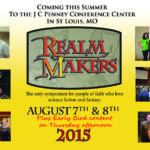Relics, Relics, Relics
Is Robert Liparulo the latest novelist to emphasize an Old-Testament-style MacGuffin?1 His latest release, The Judgment Stone, is now in the Speculative Faith library, and the Thomas Nelson release’s back cover describes its titular object like this:
[T]he ruthless group of immortals called the Clan […] is after a prize that would give them unimaginable power — a piece of the Ten Commandments known as the Judgment Stone.
Those who touch the Stone can see into the spiritual world: angelic warriors, treacherous demons, and the blue threads of light that signal the presence of believers in communion with God.
By following the blue beam radiating from those closest to God, the Clan plans to locate His most passionate followers and destroy them.

He will take all the Mushim and put ‘em in a Mushim museum, and charge the people a dollar and a half just to see ‘em.
Just now I noticed that this sort of thing often occurs in Christian speculative fiction, especially novels from mainstream publishers. Yet it’s hard to categorize this trope other than with something like my term above, OT MacGuffin. Surely there’s a Jewish-sounding name to serve as shorthand, so once again all those seemingly dull Biblical genealogies come to our rescue. Voila, we have a potential name, from 1 Chronicles 6:19: the Mushi.
Mush·i (mŭsh`ē, moosh`ē)
noun
1. Proper name. A great-grandson of Levi described in 1 Chronicles 6:19.
2. A trope of Christian fiction, generally an object the novel holds as referenced in the Bible but which turns out to have Surprising Supernatural Powers for plot purposes and Quests and significant Battles Between Saints and Villains. (Very common in evangelical end-times and spiritual-warfare novels.)
Examples:
- Book of Days: The titular object, supposedly lost in Oregon, records all the world’s history as written by God. As a Mushi, though, it’s quite underplayed in the story.
- The Chair: This titular object was supposedly built by Christ the carpenter.
- The Cheveis Trilogy: Messes with convention by making the Mushi the Bible itself.
- [Every end-times novel ever written, more or less, by a popular Christian teacher known primarily for prophecy-oriented radio broadcasts]: bland heroes who question God’s existence are convinced when World Events confirm Ancient Texts.
- The Face of God: By collecting two valuable jewels originally found in the priest’s breastplate as described in Leviticus, you should be able to see the titular Face.
- [Most novels themed around the Nephilim]: Heroes seek old race of demon/human immortals dating back to Noah’s days. (For similar groups of Biblical-era immortal humans/creatures, see the Jerusalem’s Undead series or The Immortal Files series.)
- Rift in Time: Hero easily finds Noah’s Ark in opening chapters, then pursues a certain other Ark. In the sequel, Hidden in Time, he ups the ante for the Garden of Eden.
- The Sending: The Garden of Eden is the subject of another hero’s quest.
Note that I’m not critiquing these novels. With few exceptions, I’ve not read them. 2 But the prevalence of these OT-based magic objects, Mushim, makes me curious. Why so many? I thought we had a whole Reformation over, in part, Church veneration of supposed magic relics. I thought Christians didn’t get into that whole relic-worship practice.
Perhaps I’m being naïve. Professing Christians still have a craving for relics, from the Ark of Noah that keeps getting “found” to the Shroud of Turin claims, to “Bible codes” and Old-Testament prophecies that skipped their original readers to “apply” directly to Americans.
Evidently readers get bored with the Story of Scripture and prefer chasing its props.
Instead of the titles The Bible or The Gospel — i.e., God’s Spell, His transforming and even enchanting Story — its title in effect becomes Nephilim or Magic Ark/Prophecy/Shroud.
Why condemn this trope as evil? Its sin may be worse: being utterly joyless and boring.
And it may lead to (I say this in general) sillier stories based on relics, not relationships.
Aren’t people more interesting, with their dreams, struggles, and transformations? Isn’t a magical “Biblical” Mushi far duller even than the Mushi from 1 Chronicles 6:19?
- Here I consider this distinct from the usual-suspect MacGuffins found in fantasy universes, officially known now as Magicuffins, such as swords of destiny, bewitched crowns, lost maps, etc. ↩
- And I’ve read 75 percent of all end-times novels ever written because I’ve read the whole Left Behind series. ↩











































I don’t know if you’ve read The 13th Tribe or not, but I have to say that it is the best novel I have read in years. There may be a tribe of ancient, immortal human beings (who have no supernatural powers other than the fact that they were cursed with immortality), but the focus of the whole story is on people’s dreams, struggles, and transformations. Jagger Baird, the protagonist, is trying to come to terms with the fact that he lost not only his arm in an auto accident, but his friend’s entire family. He is angry with God, who seems to have let that tragedy occur.
Likewise, the Tribe members seek to win God’s approval by killing sinners. They want to finally be able to die and they can’t figure out why they’re still alive. After all, aren’t they doing God’s work?
I pray that you don’t consider the elements of The 13th Tribe as an “evil” trope. It was beautifully written and full of heart, and I look forward to reading The Judgment Stone!
Thanks for your comment (and mini-review!).
The book does sound interesting, and that’s why I made sure to include this reminder:
Here I’m addressing what evangelical reader demand/preference seems to be driving the more magic-object-oriented sorts of stories. It does seem odd that a story that is primarily driven by characters’ struggles would be marketing by a Mushim as its title. However, it doesn’t sound like The 13th Tribe qualifies as a Mushim-driven Quest.
I do appreciate the disclaimer. 🙂
The 13th Tribe is far from a “Mushim-driven quest.” However, I can’t say that about The Judgment Stone since I have not yet read it.
My concern with The Thirteenth Tribe was that we didn’t see the emotional and mental effect of immortality on the characters–especially the kids. Were they sick of being seven, twelve for ever? But maybe that’s another trope…
I recall it being mentioned that since the children (and everyone else) had ceased to mature mentally as well as physically, the children didn’t seem to be fully aware that they were really that old.
This reminds me of the Veggie Tales “Minnesota Cuke” episodes (and, of course, Indiana Jones…)
To quote Bob the Tomato: “No, no, it’s not the hairbrush that gave Samson his strength, it was God!”
I had to laugh, because “mushi” (strictly the “moo-shi” pronunciation) is Japanese for “bug,” and I first ran across it in an anime called “Mushi-Shi,” where the word is used to describe Shinto-type spirits of incorporeal life. (It’s a good, well-drawn anime, by the way, though slow-moving and very Zen.)
Don’t be so fast to dismiss magical or spiritually important objects from storytelling. There must be mythic precedent for it. Certainly, the classic fantasies use magic objects. The One Ring is only the most obvious example from Tolkien; the sword Narsil/Andúril clearly qualifies.
Now, I do agree that there is a problem with the approach implied from the description of The Judgment Stone (not having read it). To me, by far the worst part of that description is the “blue threads of light that signal the presence of believers in communion with God.” Even in a totally made up fantasy universe without explicit religion, a magic system based on “blue threads of light” would be unbearably cheesy. When applied to real-world Christian spirituality, it crosses the line from potentially endearing campy-cheesy to creepy-cheesy.
*sigh*
If you’re going to imply that Catholics aren’t Christians, you had better explain why Evangelical SF fans are so fond of Tolkien the Catholic. Idolatry was never right, not when Catholics were doing it before the Reformation, not today in any kind of church. But the desire to make idols of relics must come from a corruption of a holy desire. Humans really do have a deep sense of reverence and spiritually significance, and assigning that significance to special objects can be an excellent storytelling technique when used well.
Not my intent.
It’s the worship, not finding or even enjoyment of relics, that is the problem, just as you said. (See also icons, music, anything else used for worship and for idolatry.)
As for the blue rays, it does sound cheesy, but I haven’t read the book.
All I can say for sure is that those blue rays better also be available in DVD. Hey-oh.
Oh, I’m sorry to have come across as accusatory. You’re right, the Reformation did help all Western Christianity become aware of some of the problems of idolatry and corruption, including the Catholic Church. I took your comment out of context. There is no question that the Reformation was very good for the spiritual health of Catholicism.
I have the urge to defend Bob and several other authors listed here…
Good criticism. I wasn’t all that aware at how prevalent this trope was.
I think it’s symptomatic of the larger argument of “safe” magic. To make magic safe for use in a real-world setting, it has to be tied to the Bible. You can’t really search for Lemuria, but you can the Garden of Eden. You can’t search for a philosopher’s stone, but you can for say the Urim and Thummin. You can’t have immortal elves, but immortals through Biblical means are okay.
So you have the Mushi. It’s a safe form of shorthand. You aren’t going to risk alienating people even if you make a justifications about how magical beings could exist in a world where the Christian God does too, and how redemption and salvation affect them too. There’s always the potential in that to get tarred with a theological mistake, or accused of whitewashing sin. So slap on the Mushi, and it’s good.
In our modern world of cloud computing, online everything, synchronized devices, etc., knowledge is less and less confined by matter (i.e., you don’t need to travel to some obscure archive to find a mythical tome that holds the key to an ancient mystery, because that tome is now on Google Books or Project Gutenberg, accessible anywhere), and that’s just no fun. The whole point of a quest is going somewhere that has what you’re looking for – searching for the matter/object/thing that holds the knowledge/power/secret.
In the old days, an actual book was as valuable as the contents it contained, and it could just as easily be a stone, statue, shroud, etc. Not so anymore, but as D.M. pointed out, Christians have to play it safe with magic. This trope preserves the “quest” archetype in a modern setting and hopefully doesn’t offend the Christian market (obviously it doesn’t with Thomas Nelson showing up in this discussion). Personally, I’m not very interested in stories like these because it seems that the author is trying to fit an already-overused trope into a Christian mold. I’m sure there are plenty of good stories in this vein, but it’s hard to look past the impression of “how can we Christianize something that works well in the secular world?”